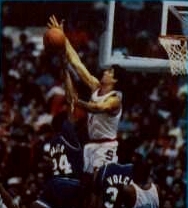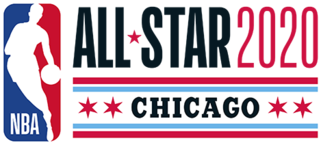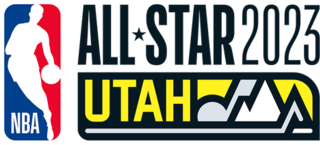The NBA Most Valuable Player Award (MVP) is an annual National Basketball Association (NBA) award given since the 1955–56 season to the best performing player of the regular season. Since the 2022–23 season, winners receive the Michael Jordan Trophy, named for the five-time MVP often considered to be the greatest player in NBA history.
The NBA Defensive Player of the Year Award is an annual National Basketball Association (NBA) award given since the 1982–83 NBA season to the best defensive player of the regular season. The winner is selected by a panel of 124 sportswriters and broadcasters throughout the United States and Canada, each of whom casts a vote for first, second and third place selections. Each first-place vote is worth five points, second-place votes are worth three points, and a third-place vote is worth one. The player with the highest point total, regardless of the number of first-place votes, wins the award. Since the 2022–23 NBA season, winners receive the Hakeem Olajuwon Trophy, named after the two-time defensive player of the year winner.
The Bill Russell NBA Finals Most Valuable Player award is an annual National Basketball Association (NBA) award given since the 1969 NBA Finals. The award is decided by a panel of eleven media members, who cast votes after the conclusion of the Finals. The person with the highest number of votes wins the award. The award was originally a black trophy with a gold basketball-shaped sphere at the top, similar to the Larry O'Brien Trophy, until a new trophy was introduced in 2005.

Ronald Fred Seikaly is a Lebanese-American former professional basketball player. He was one of the first internationally born players to make an impact on American basketball. Considered one of the top college players from the Syracuse basketball program, Seikaly's stellar offense and defense placed him among the school's all-time leaders in rebounds, points and blocks, while earning several nationally recognized awards and honors. Drafted into the National Basketball Association (NBA) by the Miami Heat with the 9th pick of the 1988 draft and the first-ever pick for the Heat, Seikaly developed into one of the best centers in the NBA and the team's top offensive and defensive contributors—winning NBA player of the week twice—and also amassing many of the team's records . His career highs with the Heat are 40 points, 34 rebounds, 8 blocks, 8 assists, and 5 steals. Seikaly earned the 1990 NBA Most Improved Player Award and later played for the Golden State Warriors, Orlando Magic and New Jersey Nets and in Spain with FC Barcelona. He was also part of the United States national basketball team during the 1986 FIBA World Championship, winning gold. After his retirement from basketball, Seikaly became a successful real estate developer. He also works in electronic music as a producer/DJ, and hosted his radio show, Sugar Free Radio, on Sirius/XM.
The NBA All-Defensive Team is an annual National Basketball Association (NBA) honor given since the 1968–69 NBA season to the best defensive players during the regular season. The All-Defensive Team is generally composed of ten players in two five-man lineups, a first and a second team. Voting is conducted by a panel of 123 writers and broadcasters. Prior to the 2013–14 NBA season, voting was performed by the NBA head coaches, who were restricted from voting for players on their own team. The players each receive two points for each first team vote and one point for each second team vote. The top five players with the highest point total make the first team, with the next five making the second team. In the case of a tie at the fifth position of either team, the roster is expanded. If the first team consists of six players due to a tie, the second team will still consist of five players with the potential for more expansion in the event of additional ties. Ties have occurred several times, most recently in 2013 when Tyson Chandler and Joakim Noah tied in votes received.
The All-NBA Team is an annual National Basketball Association (NBA) honor bestowed on the best players in the league following every NBA season. The voting is conducted by a global panel of sportswriters and broadcasters. The team has been selected in every season of the league's existence, dating back to its inaugural season in 1946. The All-NBA Team originally had two teams, but since 1988 it is typically composed of three five-man lineups—a first, second, and third team.
The NBA All-Star Game Kobe Bryant Most Valuable Player (MVP) is an annual National Basketball Association (NBA) award given to the player(s) voted best of the annual All-Star Game. The award was established in 1953 when NBA officials decided to designate an MVP for each year's game. The league also re-honored players from the previous two All-Star Games. Ed Macauley and Paul Arizin were selected as the 1951 and 1952 MVP winners respectively. The winner is voted upon by a panel of media members, who cast their vote after the conclusion of the game. The fan voting accounts for 25% of the voting. The player(s) with the most votes or ties for the most votes wins the award. In February 2020, Commissioner Adam Silver renamed the NBA All-Star Game Most Valuable Player in honor of four-time winner Kobe Bryant, who died in a helicopter crash a few weeks earlier.
The 1997–98 NBA season was the Jazz's 24th season in the National Basketball Association and 19th season in Salt Lake City, Utah. The Jazz had been runner-ups in the 1997 NBA Finals, where they lost to the Chicago Bulls in six games. In the 1997-98 season, the Jazz again reached the Finals and were again defeated by the Bulls in six games.

This page details the all-time statistics, records, and other achievements pertaining to the Miami Heat. The Miami Heat is an American professional basketball team currently playing in the National Basketball Association.

Giannis Sina Ugo Antetokounmpo is a Greek and Nigerian professional basketball player for the Milwaukee Bucks of the National Basketball Association (NBA). His size, speed, strength, and country of origin have earned him the nickname "Greek Freak". He is widely regarded as one of the greatest power forwards of all time as well as one of the greatest players of all time.

Lauri Elias Markkanen is a Finnish professional basketball player for the Utah Jazz of the National Basketball Association (NBA), and for the Finland national team. Nicknamed "the Finnisher", he is the son of Finnish basketball players Pekka and Riikka Markkanen, and the younger brother of footballer Eero Markkanen.

Pascal Siakam is a Cameroonian professional basketball player for the Indiana Pacers of the National Basketball Association (NBA). A two-time NBA All-Star and two-time All-NBA selection, he won an NBA championship with the Toronto Raptors in 2019. Siakam played college basketball for the New Mexico State Aggies and was named the Western Athletic Conference Player of the Year in 2016. Nicknamed "Spicy P", he was selected by Toronto with the 27th overall pick in the first round of the 2016 NBA draft.
This page details the all-time statistics, records, and other achievements pertaining to the Milwaukee Bucks.

The 2019 NBA All-Star Game was an exhibition basketball game that was played on February 17, 2019, during the National Basketball Association's (NBA) 2018–19 season. It was the 68th edition of the NBA All-Star Game, and was played at the Spectrum Center in Charlotte, North Carolina, at the home of the Charlotte Hornets. Team LeBron defeated Team Giannis, 178–164. This was the second time that the NBA All-Star Game format was not Eastern Conference versus Western Conference. Charlotte was announced as host on May 24, 2017. This was the second time that Charlotte hosted the All-Star Game; the first time was in 1991, at the Hornets' previous home arena Charlotte Coliseum.

The 2020 NBA All-Star Game was an exhibition basketball game that was played on February 16, 2020, during the National Basketball Association's (NBA) 2019–20 season. It was the 69th edition of the NBA All-Star Game, and was played at the United Center in Chicago, home of the Chicago Bulls. Team LeBron defeated Team Giannis, 157–155. This was the third time that Chicago hosted the All-Star Game. The other two times, in 1973 and 1988, the game was played at Chicago Stadium, the Bulls' previous home arena. The game was televised nationally by TNT for the 18th consecutive year, and simulcast by TBS for the 6th consecutive year. After airing a “Players Only” broadcast a year ago, TBS returned to simulcasting TNT’s coverage, after the “Players Only” brand was canceled by the NBA and Turner Sports.
The 2018–19 NBA season was the 73rd season of the National Basketball Association (NBA). The regular season began on October 16, 2018, and ended on April 10, 2019. The 2019 NBA All-Star Game was played on February 17, 2019, at Spectrum Center in Charlotte, North Carolina. The playoffs began on April 13, 2019 and ended on June 13 with the Toronto Raptors defeating the defending NBA champion Golden State Warriors in the 2019 NBA Finals.

The 2023 NBA All-Star Game was an exhibition game played on February 19, 2023, during the National Basketball Association's 2022–23 season, held on the 30th anniversary of the first All-Star Game held in Salt Lake City in 1993. It was the 72nd edition of the event. The game was hosted by the Utah Jazz at Vivint Arena, and was televised nationally by TNT for the 21st consecutive year.
The 2021 NBA playoffs was the postseason tournament of the National Basketball Association's 2020–21 season. With the COVID-19 pandemic impacting the NBA for the second consecutive year, the regular season was reduced to 72 games for each team and the start date of the playoffs was moved from its usual time in mid-April to May 22, 2021. It ended with the 2021 NBA Finals in July.
The 2022 NBA playoffs was the postseason tournament of the National Basketball Association's 2021–22 season. The playoffs began on April 16 and ended on June 16 with the conclusion of the 2022 NBA Finals. The playoffs also returned to its normal April–June schedule for the first time since 2019, before the COVID-19 pandemic resulted in two postponements in 2020 and 2021.
The initiation of immigrants in the National Basketball Association (NBA) has changed throughout the league's history and there have been many conversations on the experiences of immigrants in the league. In the NBA world, players born outside the United States, including in U.S. overseas territories, are considered and called international players. The first non-American player to play in the league was in 1946, and now more than 100 have joined seven decades later. According to Forbes, the NBA in 2021 was composed of 23% international players. This is a stark contrast from the percentage in 1992, which was only 5%. The number of international players has increased steadily from 35 in the 1999–2000 season to 80 in the 2006–2007 season, accounting for 18% of the team rosters.











